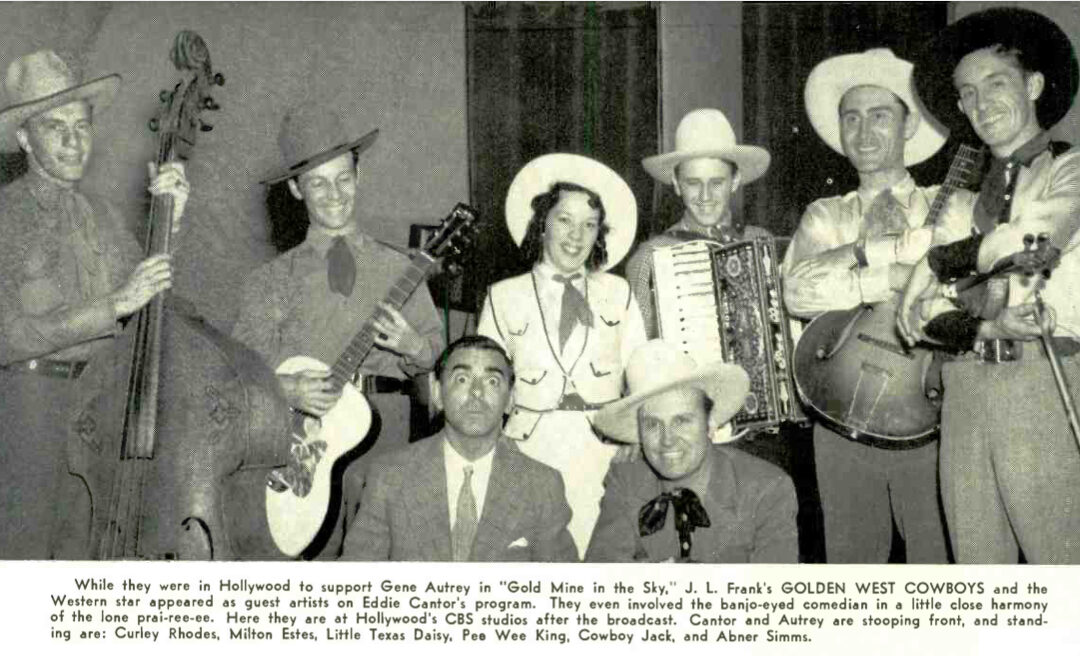By Sasha Dunavant
Milton Escoe Estes first performed at the Grand Ole Opry after his move to Nashville in 1937.
While working as a bass singer and an emcee with Pee Wee King’s Golden West Cowboys in the 1930s, Estes sang with Cowboy Copas, Eddy Arnold, Redd Stewart, Tommy Sosebee and others.
The artist took a break from Country music when he briefly moved to Raleigh, N.C., where he is listed as a lodger in a boarding house on Newbern Avenue in the 1940 U.S. Federal Census.
There he began a Southern gospel music career by becoming lead singer for the Lone Star Quartet. The group was originally out of Texas but found success in Raleigh on radio station WPTF. Estes continued incorporating his love for Southern gospel into his music-related jobs for the remainder of his life.
A longtime member of the quartet, he not only sang but served as their emcee. His developed a character known as “Uncle Milt” that captured audience attention through comedy routines as well.
When Estes registered for the draft in 1940, he stated that he was living in Louisville, Kentucky, and working at WHAS radio. He had married Mary Rosaline Gore of Livingston, Tennessee, in the early 1930s, and they were the parents of a son, Dennis Milton Estes (1936-1999).
Estes served in the Infantry, Armored/Mechanized Units during World War II. In December of 1944 he was wounded in battle and was admitted to a military hospital for shrapnel removal from his hand and foot, according to this military records.
In 1946 at age 32 Estes returned to Nashville to perform on radio station WSM.
Estes soon formed a group called the “Musical Millers,” which signed with Decca Records in 1947. Milton Estes and his Musical Millers released 10 singles and four singles. One of their singles was a cover of the song “House of Gold,” a song that had been recorded by Hank Williams as a demo but never released commercially.
He was regularly intertwining Southern gospel and Country music on the Grand Ole Opry stage, where he was one of the key performers of the period. He also called dances Opry and recorded square dancing records along with his band.
Estes became a host, or as he called it “the flour peddler,” for The Martha White Flour segment for the Grand Ole Opry on WSM radio during which he hosted popular acts such as, Jimmy Selph, Lew Childre and String Bean. Estes began the segment with “New Filipino Baby” and ended the show with the widely–known gospel song, “I’ll Fly Away.”
Additionally, he hosted other morning and afternoon radio shows on WSM, including “Noontime Neighbors” with Owen Bradley.
Estes recorded vocals on four singles for Bill Monroe and the Blue Grass Boys. The recordings include the song, “I’m Working on a Building.”
At the start of the 1950s, Estes co-wrote “20/20 Vision and Walking Around Blind” with Joe Allison. Singing cowboy Gene Autry recorded the song first, and it was later covered and popularized by Blue Grass singer Jimmy Martin.
In 1953 Estes left Nashville for Detroit, Michigan, where he served as a promoter for the musicians on the Grand Ole Opry and emceed for the Motor City Jamboree. He had lived in Michigan as a teenager with his widowed mother who worked for the railroad in the late 1920s and early 1930s.
Newspapers of the 1950s delighted in mentioning that Estes had piloted his own plane into the town where he was set to emcee or perform.
Estes eventually relocated to Columbus, Georgia, and worked as a television announcer. Born on May 9, 1914, in the small community of Arthur in northeast Tennessee, Estes died on Aug. 23, 1963, in Oklahoma City, Oklahoma. He is buried in Drummonds Cemetery in Tazewell, Tennessee.

